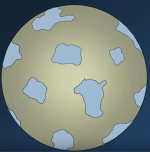Why then, does Genesis 1: 8a state, “And God called the expanse heaven” ? Here are two interpretations:
a. “The expanse” meant the atmosphere or outer space.
b. “The expanse” meant “heaven”—where God dwelt—the original paradise. Recall that God “walked” and “talked” with Adam (Genesis 3:8–9), so heaven was originally on the Earth—on the Earth’s crust.
If “heaven” meant atmosphere or outer space, then the Septuagint and Vulgate translators incorrectly associated solidness with it. Notice also that the similarities of raqia ((ayqirf) with baqia ((ayqib@f) and raqa ((qarf) support the second interpretation. [See page
534.] If raqia (expanse or firmament) always means atmosphere or outer space, five questions, or apparent textual contradictions, arise.
Question 1: Why was the word raqia followed by the phrase “of the heavens” in Genesis 1:14, 15, 17, and 20? That would be redundant.
Question 2: If raqia implies a canopy, why wasn’t one of the three Hebrew words that clearly means “canopy” used?
Question 3: Genesis 1:1 says that the heavens were created on the first day.
19 However, if raqia always means “heaven” (atmosphere or outer space), then Genesis 1: 8a says heaven was created on the second day. Also, Genesis 1: 8a defines heaven after the word “heavens” was first used in Genesis 1:1. Normally, a word’s meaning is understood from the context of its first usage.
After struggling to understand Genesis 1:8a for 30 years, I described several possible interpretations of Genesis 1:8a in the 7th edition (2001) of this book. In 2005, I received independent letters from two pastors proposing an explanation.
22 Before Adam’s fall, Earth was a paradise; in a sense, it was “heaven on Earth.” Therefore, God called the firmament (Earth’s crust) heaven. (Notice: God did not call heaven “the firmament.”) Each pastor provided different biblical reasons for his view, but both maintained that our difficulty in understanding Genesis 1:8a results largely from our inability to imagine the original paradise. If man had not fallen, no one would have difficulty with the fact that God called the Earth “heaven.”
Confirmation of this is in Randy Alcorn’s outstanding book, Heaven (2004).
23 His case is so detailed, voluminous, and strong that any attempt to summarize it here would not do justice to his work. As Alcorn points out, nonbiblical stereotypes of heaven have crept into our Christian culture. I believe this accounts for much of our confusion over Genesis 1:8a. (Every Christian should study what the Bible actually says.) Earth was created with the intention that it would be heaven. The fall temporarily delayed that plan, and the Earth was cursed. Alcorn also discusses the future “new Earth.”
Those who reject this proposed understanding of expanseand Genesis 1:8a should carefully weigh the two choices.
HPT


